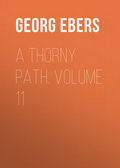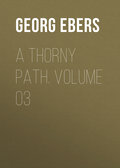
Georg Ebers
Serapis. Volume 04
CHAPTER XVIII
Alarming as was the outlook in Alexandria, the races, were to be held as usual. This had been decided only a few hours since at the Bishop's palace, and criers had been sent abroad throughout the streets and squares of the city to bid the inhabitants to this popular entertainment. In the writing-office of the Ephemeris, which would be given to the public the first thing in the morning, five hundred slaves or more were occupied in writing from dictation a list of the owners of the horses, of the 'agitatores' who would drive them, and of the prizes offered to the winners, whether Christians or heathen.
[Ephemeris—The news-sheet, which was brought out, not only in Rome, but in all the cities of the Empire, and which kept the citizens informed of all important events.]
The heat in the Episcopal council-hall had been oppressive, and not less so the heat of temper among the priests assembled there; for they had fully determined, for once, not to obey their prelate with blind submission, and they knew full well that Theophilus, on occasion, if his will were opposed, could not merely thunder but wield the bolt.
Besides the ecclesiastical members of the council, Cynegius, the Imperial legate—Evagrius, the Prefect—and Romanus, the commander-in-chief and Comes of Egypt,—had all been present. The officials of the Empire— Roman statesmen who knew Alexandria and her citizens well, and who had often smarted under the spiritual haughtiness of her Bishop—were on the prelate's side. Cynegius was doubtful; but the priests, who had not altogether escaped the alarms that had stricken the whole population, were so bold as to declare against a too hasty decision, and to say that the celebration of the games at a time of such desperate peril was not only presumptuous but sinful, and a tempting of God.
In answer to a scornful enquiry from Theophilus as to where the danger lay if—as the Comes promised—Serapis were to be overthrown on the morrow, one of the assembly answered in the name of his colleagues. This man, now very old, had formerly been a wonderfully successful exorcist, and, notwithstanding that he was a faithful Christian, he was the leader of a gnostic sect and a diligent student of magic. He proceeded to argue, with all the zeal and vehemence of conviction, that Serapis was the most terrible of all the heathen daemons, and that all the oracles of antiquity, all the prophecies of the seers, and all the conclusions of the Magians and astrologers would be proved false if his fall—which the present assembly could only regard as a great boon from Heaven—did not entail some tremendous convulsion of nature.
At this Theophilus gave the reins to his wrath; he snatched a little crucifix from the wall above his episcopal throne, and broke it in fragments, exclaiming in deep tones that quavered with wrath:
"And which do you regard as the greater: The only-begotten Son of God, or that helpless image?" And he flung the pieces of the broken crucifix down on the table round which they were sitting. Then, as though horror- stricken at his own daring act, he fell on his knees, raised his eyes and hands in prayer, and gathering up the broken image, kissed it devoutly.
This rapid scene had a tremendous effect. Amazement and suspense were painted on every face, not a hand, not a lip moved as Theophilus rose again and cast a glance of proud and stern defiance round the assembly, which each man took to himself. For some moments he remained silent, as though awaiting a reply; but his repellent mien and majestic bearing made it sufficiently clear that he was ready to annihilate any opponent. In fact none of the priests contradicted him; and, though Evagrius looked at him with a doubting shake of his shrewd head, Cynegius on the other hand nodded assent. The Bishop, however, seemed to care for neither dissent nor approval, and it was in brief and cutting terms, with no flourish of rhetoric, that he laid it down that wood and stone had nothing to do with the divine Majesty, even though they were made in the image of all that was Holy and worshipful or were most lavishly beautified by the hand of man with the foul splendors of perishable wealth. The greater the power ascribed by superstition to the base material—whatever form it bore—the more odious must it be to the Christian. Any man who should believe that a daemon could turn even a breath of the Most High to its own will and purpose, would do well to beware of idolatry, for Satan had already laid his clutches somewhere on his robe.
At this sweeping accusation many a cheek colored wrathfully, and not a word was spoken when the Bishop proceeded to require of his hearers that, if the Serapeum should fall into the hands of the Imperial troops, it should be at once and ruthlessly destroyed, and that his hearers should not cease from the work of ruin till this scandal of the city should be swept from the face of the earth.
"If then the world crumbles to atoms!" he cried, "well and good—the heathen are right and we are wrong, and in that case it were better to perish; but as surely as I sit on this throne by the grace of God, Serapis is the vain imagining of fools and blind, and there is no god but the God whose minister I am!"
"Whose Kingdom is everlasting, Amen!" chanted an old priest; and Cynegius rose to explain that he should do nothing to hinder the total overthrow of the temple and image.
Then the Comes spoke in defence of the Bishop's resolution to allow the races to be held, as usual, on the morrow. He sketched a striking picture of the shallow, unstable nature of the Alexandrians, a people wholly given over to enjoyment. The troops at his command were few in number in comparison with the heathen population of the city, and it was a very important matter to keep a large proportion of the worshippers of Serapis occupied elsewhere at the moment of the decisive onset. Gladiator-fights were prohibited, and the people were tired of wild beasts; but races, in which heathen and Christian alike might enter their horses for competition, must certainly prove most attractive just at this time of bitter rivalry and oppugnancy between the two religions, and would draw thousands of the most able-bodied idolaters to the Hippodrome. All this he had already considered and discussed with the Bishop and Cynegius; nay, that zealous destroyer of heathen worship had come to Alexandria with the express purpose of overthrowing the Serapeum; but, as a prudent statesman, he had first made sure that the time and circumstances were propitious for the work of annihilation. All that he had here seen and heard had only strengthened his purpose; so, after suggesting a few possible difficulties, and enjoining moderation and mercy as the guiding principles of his sovereign, he commanded, in the Emperor's name, that the sanctuary of Serapis should be seized by force of arms and utterly destroyed, and that the races should be held on the morrow.
The assembled council bowed low; and when Theophilus had closed the meeting with a prayer he withdrew to his ungarnished study, with his head bent and an air of profound humility, as though he had met with a defeat instead of gaining a victory.
…………………..
The fate of the great god of the heathen was sealed, but in the wide precincts of the Serapeum no one thought of surrender or of prompt defeat. The basement of the building, on which stood the grandest temple ever erected by the Hellenes, presented a smooth and slightly scarped rampart of impregnable strength to the foe. A sloping way extended up over a handsomely-decorated incline, and from the middle of the grand curve described by this road, two flights of steps led up to the three great doors in the facade of the building.
The heathen had taken care to barricade this approach in all haste, piling the road and steps with statuary-images of the gods of the finest workmanship, figures and busts of kings, queens, and heroes, Hermes, columns, stelae, sacrificial stones, chairs and benches-torn from their places by a thousand eager hands. The squared flags of the pavement and the granite blocks of the steps had been built up into walls and these were still being added to after the besiegers had surrounded the temple; for the defenders tore down stones, pilasters, gutters and pieces of the cornice, and flung them on to the outworks, or, when they could, on to the foe who for the present were not eager to commence hostilities.
The captains of the Imperial force had miscalculated the strength of the heathen garrison. They supposed a few hundreds might have entrenched themselves, but on the roof alone above a thousand men were to be seen, and every hour seemed to increase the number of men and women crowding into the Serapeum. The Romans could only suppose that this constantly growing multitude had been concealed in the secret halls and chambers of the temple ever since Cynegius had first arrived, and had no idea that they were still being constantly reinforced.
Karnis, Herse, and Orpheus, among others, had made their way thither from the timber-yard, down the dry conduit, and an almost incessant stream of the adherents of the old gods had preceded and followed them.
While Eusebius had been exhorting his congregation in the church of St. Mark to Christian love towards the idolaters, these had collected in the temple precincts to the number of about four thousand, all eager for the struggle. A vast multitude! But the extent of the Serapeum was so enormous that the mass of people was by no means densely packed on the roof, in the halls, and in the underground passages and rooms. There was no crowding anywhere, least of all in the central halls of the temple itself; indeed, in the great vestibule crowned with a dome which formed the entrance, in the vast hall next to it, and in the magnificent hypostyle with a semicircular niche on the furthest side in which stood the far-famed image of the god, there were only scattered groups of men, who looked like dwarfs as the eye compared them with the endless rows of huge columns.
The full blaze of day penetrated nowhere but into the circular vestibule, which was lighted by openings in the drum of the cupola that rested on four gigantic columns. In the inner hall there was only dim twilight; while the hypostyle was quite dark, but for a singularly contrived shaft of light which produced a most mysterious effect.
The shadows of the great columns in the fore hall, and of the double colonnade on each side of the hypostyle, lay like bands of crape on the many-colored pavement; borders, circles, and ellipses of mosaic diversified the smooth and lucent surface, in which were mirrored the astrological figures which sparkled in brighter hues on the ceiling, the trophies of symbols and mythological groups that graced the walls in tinted high relief, and the statues and Hermes between the columns. A wreath of lovely forms and colors dazzled the eye with their multiplicity and profusion, and the heavy atmosphere of incense which filled the halls was almost suffocating, while the magical and mystical signs and figures were so many and so new that the enquiring mind, craving for an explanation and an interpretation of all these incomprehensible mysteries, hardly dared investigate them in detail.
A heavy curtain, that looked as though giants must have woven it on a loom of superhuman proportions, hung, like a thick cloud shrouding a mountain-peak, from the very top of the hypostyle, in grand folds over the niche containing the statue, and down to the floor; and while it hid the sacred image from the gaze of the worshipper it attracted his attention by the infinite variety of symbolical patterns and beautiful designs which were woven in it and embroidered on it.
The gold and silver vessels and precious jewels that lay concealed by this hanging were of more value than many a mighty king's treasure; and everything was on so vast a scale that man shuddered to feel his own littleness, and the mind sought some new standard of measurement by which to realize such unwonted proportions. The finite here seemed to pass into the infinite; and as the spectator gazed up, with his head thrown back, at the capitals of the lofty columns and the remote height of the ceiling, his sight failed him before he had succeeded in distinguishing or even perceiving a small portion only of the bewildering confusion of figures and emblems that were crowded on to the surface. Greek feeling for beauty had here worked hand in hand with Oriental taste for gorgeous magnificence, and every detail could bear examination; for there was not a motive of the architecture, not a work of sculpture, painting, or mosaic, not a product of the foundry or the loom, which did not bear the stamp of thorough workmanship and elaborate finish. The ruddy, flecked porphyry, the red, white, green, or yellow marbles which had been used for the decorations were all the finest and purest ever wrought upon by Greek craftsmen. Each of the hundreds of sculptured works which here had found a home was the masterpiece of some great artist; as the curious visitor lingered in loving contemplation of the mosaics on the polished floor, or examined the ornamental mouldings that framed the reliefs, dividing the walls into panels, he was filled with wonder and delight at the beauty, the elegance and the inventiveness that had given charm, dignity, and significance to every detail.
Adjoining these great halls devoted especially to the worship of the god, were hundreds of courts, passages, colonnades and rooms, and others not less numerous lay underground. There were long rows of rooms containing above a hundred thousand rolls of books, the famous library of the Serapeum, with separate apartments for readers and copyists; there were store-rooms, refectories and assembly-rooms for the high-priests of the temple, for teachers and disciples; while acrid odors came up from the laboratories, and the fragrance of cooking from the kitchen and bake- houses. In the very thickness of the walls of the basement were cells for penitents and recluses, long since abandoned, and rooms for the menials and slaves, of whom hundreds were employed in the precincts; under ground spread the mystical array of halls, grottoes, galleries and catacombs dedicated to the practice of the Mysteries and the initiation of neophytes; on the roof stood various observatories—among them one erected for the study of the heavens by Eratosthenes, where Claudius Ptolemaeus had watched and worked. Up here astronomers, star-gazers, horoscopists and Magians spent their nights, while, far below them, in the temple-courts that were surrounded by store-houses and stables, the blood of sacrificed beasts was shed and the entrails of the victims were examined.
The house of Serapis was a whole world in little, and centuries had enriched it with wealth, beauty, and the noblest treasures of art and learning. Magic and witchcraft hedged it in with a maze of mystical and symbolical secrets, and philosophy had woven a tissue of speculation round the person of the god. The sanctuary was indeed the centre of Hellenic culture in the city of Alexander; what marvel then, that the heathen should believe that with the overthrow of Serapis and his temple, the earth, nay the universe itself must sink into the abyss?
Anxious spirits and throbbing hearts were those that now sought shelter in the Serapeum, fully prepared to perish with their god, and yet eager with enthusiasm to avert his fall if possible.
A strange medley indeed of men and women had collected within these sacred precincts! Grave sages, philosophers, grammarians, mathematicians, naturalists, and physicians clung to Olympius and obeyed him in silence. Rhetoricians with shaven faces, Magians and sorcerers, whose long beards flowed over robes embroidered with strange figures; students, dressed after the fashion of their forefathers in the palmy days of Athens; men of every age, who dubbed themselves artists though they were no more than imitators of the works of a greater epoch, unhappy in that no one at this period of indifference to beauty called upon them to prove what they could do, or to put forth their highest powers. Actors, again, from the neglected theatres, starving histrions, to whom the stage was prohibited by the Emperor and Bishop, singers and flute- players; hungry priests and temple-servitors expelled from the closed sanctuaries; lawyers, scribes, ships' captains, artisans, though but very few merchants, for Christianity had ceased to be the creed of the poor, and the wealthy attached themselves to the faith professed by those in authority.
One of the students had contrived to bring a girl with him, and several others, seeing this, went back into the streets by the secret way and brought in damsels of no very fair repute, till the crowd of men was diversified by a considerable sprinkling of wreathed and painted girls, some of them the outcast maids of various temples, and others priestesses of higher character, who had remained faithful to the old gods or who practised magic arts.
Among these women one, a tall and dignified matron in mourning robes, was a conspicuous figure. This was Berenice, the mother of the young heathen who had been ridden down and wounded in the skirmish near the Prefect's house, and whose eyes Eusebius had afterwards closed. She had come to the Serapeum expressly to avenge her son's death and then to perish with the fall of the gods for whom he had sacrificed his young life. But the mad turmoil that surrounded her was more than she could bear; she stood, hour after hour, closely veiled and absorbed in her own thoughts, neither raising her eyes nor uttering a word, at the foot of a bronze statue of justice dispensing rewards and punishments.
Olympius had entrusted the command of the little garrison of armed men to Memnon, a veteran legate of great experience, who had lost his left arm in the war against the Goths. The high-priest himself was occupied alternately in trying to persuade the hastily-collected force to obey their leader, and in settling quarrels, smoothing difficulties, suppressing insubordination, and considering plans with reference to supplies for his adherents, and the offering of a great sacrifice at which all the worshippers of Serapis were to assist. Karnis kept near his friend, helping him so far as was possible; Orpheus, with others of the younger men, had been ordered to the roof, where they were employed— under the scorching sun, reflected from the copper-plated covering and the radiating surface of the dome—in loosening blocks of stone from the balustrade to be hurled down to-morrow on the besieging force.







